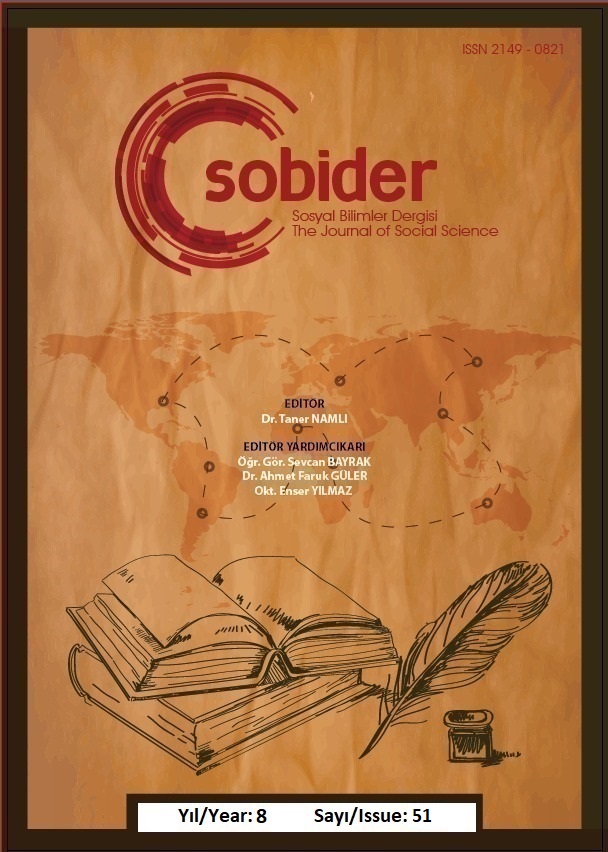Author :
Abstract
Bu makale, meleklerin masumiyeti düşüncesinin tefsir literatüründeki serencamını konu edinmektedir. Erken dönemden modern döneme kadar meleklerin ismeti konusuna tenzihçi ve mütesâhil olmak üzere iki ana yaklaşım söz konusu olmuştur. Bu bağlamda, bu iki yaklaşım sonucu ortaya çıkan yansımaları tetikleyen faktörler ele alınacak ve müfessirlerin Kuran’ı anlama/yorumlama yöntemlerine yer verilecektir. Konunun sınırlandırılması açısından Taberî (ö. 310/923), Râzî (ö. 606/1210), İbn Kesîr (ö. 774/1373) ve Reşîd Rızâ’nın (1865/1935) tefsirleri merkeze alınacaktır. Bu doğrultuda öncelikle Bakara Sûresi 34. ve 102. ayetleri çerçevesinde İblisin melek taifesinden olup olmadığı tartışması incelenecektir. Ayrıca Hârût ve Mârût etrafında dönen rivayet ve tenkitler değerlendirilecektir. Burada belirtilmelidir ki makalenin amacı, meleklerin günah işleyebildiğini savunmak değildir. Son olarak makalede, Sünnî ekolde ismet sıfatını savunanlar çoğunlukta olsa da, daha serbest tavır takınan bir damarın olduğuna dikkat çekilmeye çalışılmıştır.
Keywords
Abstract
In this article, it is going to be covered the adventure of the idea that the angels are innocent through the tafseer literature. There are mainly two approaches as exonerative and lax to the innocence of angels from early to modern times. Within this context, it is handled the factors inducing the reflections out of these two approaches and given place the methodologies of the exegetes to understand/interpret Qurān. In order to be restricted the topic, this study focuses on the tafseer works of Tabarī (d. 310/923), Radhī (d. 606/1210), Ibn Kathīr (d. 774/1373), and Rashīd Ridhā (d. 1865/1935). Accordingly, first it is going to be examined the debate based on the verses 34th and 142nd of the surah al-Baqara, concerning the demon is among the angels or not. In addition, it is analysed the reports and critiques around the discussion on Hārūt and Mārūt. Here it should be stated that the aim is not to argue that the angels are capable to commit sin. Finally, this article tries to draw attention to the existence of a more open line although the majority defend the innocency (ismah) in Sunnī school.
Keywords
- İbnü’l-Arabî, Muhammed b. Abdillah Ebûbekir. Ahkâmü’l-Kur’ân. thk. Muhammed Abdülkâdir Atâ. 4 cilt. Beyrut: Dâru’l-Kütübi’l-İlmiyye, 1424/2003.
- el-Beyḍâvî, Ebû Saʿîd ʿAbdullâh b. ʿOmer el-Şîrâzî. Envâru't-Tenzîl ve Esrâru't-Teʾvîl. nşr. Muḥammed ʿAbdurrahman el-Marʿaşlî. 5 cilt. Beyrut: Dâru İḥyâʾi't-Turâŝi'l-ʿArabî, 1418/1998.
- Aḥmed b. Ḥanbel, Ebû ʿAbdullâh Aḥmed b. Muḥammed b. Ḥanbel eş-Şeybânî. el-Musned. nşr. Şuʿayb el-ʾArnavûṭ, ʿÂdil Murşid v.dğr. Muessesetu'r-Risâle, 1421/2001.
- el-Âlûsî, Şihâbüddîn Mahmud. Rûhu’l-meânî fî tefsîri’l-Kur’âni’l-Azîm ve’s-sebʽi’l-mesânî. thk. Ali Abdülbârî Atıyye. 16 cilt. Beyrut: Dâru’l-Kütübi’l-İlmiyye, 1415/1995.
- ez-Zemaḫşerî, Ebû'l-Ḳâsım Maḥmûd b. ʿAmr. Esâsu'l-Belâğa. nşr. Muḥammed Bâsil ʿUyûnu's- Sevd. Beyrut: Dâru'l-Kutubi'l-ʿİlmiyye, 1419/ 1998.
- ez-Zerkeşî, Ebû ʿAbdullâh Muḥammed b. ʿAbdullâh b. Bahâdır eş-Şâfiʿî. el-Baḥru'l-Muḥîṭ fî ʾUsûli'l-Fıḳh. nşr. Dâru'l-Kutubî, 1414/1994.
- el-Ḳurṭubî, Ebû ʿAbdullâh Muḥammed b. Aḥmed el-Ḫazrecî el-Ḳurṭubî. el-Câmiʿ li-Âḥkâmi'l- Ḳur'ân. nşr. Aḥmed el-Berdûnî-İbrahim İṭfeyyiş. Kâhire: Dâru'l-Kutubi'l-Mısriyye, 1384/1964.
- İbn ʿArefe, Ebû ʿAbdullâh Muḥammed b. Muḥammed b. ʿArefe el-Verğumî et-Tûnusî. et- Tefsîr. nşr. Ḥasen el-Mennâʿî, Merkezu'l-Buḥûŝ bi-Kulliyeti'l-Zeytûniyye, 1412/1986.
- eṭ-Ṭaberî, Ebû Caʿfer Muḥammed b. Cerîr b. Yezîd el-Âmilî. Câmiʿu'l-Beyân fî Teʾvîli ʾÂyi'l- Ḳur'ân nşr. ʾAḥmed Muḥammed Şâkir, Beyrut: Muʾessesetu'r-Risâle, 1420/2000.
- el-Gazzâlî, Ebû Hâmid Muhammed el-Gazzâlî. İlcâmu’l-Avâm ‘an ilmi’l-kelâm. nşr. Muhammed Mu’tasım-Billâh el-Bağdadî, Beyrut: 1985/1405.
- eŝ-Ŝaʿlebî, Ebû İsḥâḳ Aḥmed b. Muḥammed b. İbrâhîm. el-Keşf ve'l-Beyân. nşr. Ebû Muḥammed b. ʿÂşûr. Beyrut: Dâru İḥyâi't-Turâŝi'l-ʿArabî, 1422/2002.
- el-Mâturîdî, Ebû Manṡûr Muḥammed b. Muḥammed. Teʾvîlâtu Ehli's-Sunne. nşr. Mecdî Bâsellûm. Beyrut: Dâru'l-Kutubi'l-ʿİlmiyye, 1426/2005.
- el-Mâtürîdî, Ebû Manṣur. Te’vîlâü’l-Kurân. çev. Bekir Topaloğlu. 18 Cilt. İstanbul: Ümraniye Belediyesi Kültür Yayınları, 2019.
- Muḳâtil b. Suleymân, Ebû'l-Ḥasen Muḳâtil b. Suleymân el-Belḫî. Tefsîru Muḳâtil b. Suleymân. nşr. ʿAbdullâh Maḥmûd Şeḥâte. Beyrut: 1423/2002.
- eş-Şerîf el-Curcânî, ʿAlî b. Muḥammed b. ʿAlî eş-Şerîf. Mu’cemü’t-tarîfât, thk. Muhammed Sıddik el Minşârî, Kahire: Darü’l-Fâzıle, 1425/2004.
- et-Ṭûfî, Ebu'r-Rebiʿ Suleymân b. ʿAbdulḳavî b. el-Kerîm es-Ṡarṡarî. el-İşârâtu'l-İlâhiyye ile'l- Mebâḥiŝi'l-Uṡûliyye. nşr. Muḥammed Ḥasen Muḥammed. Beyrut: Dâru'l-Kutubi'lʿİlmiyye, 1426/2005.
- Abduh, Muhammed, Rızâ Reşîd. Tefsîrü’l-Kur’âni’l-Hakîm (Tefsîrü’l-Menâr), çev. Mehmet Erdoğan-Ali Rıza Temel-Harun Ünal-Niyazi Beki-Nusret Bolelli. İstanbul: Ekin Yayınları, 2011.
- Budak Mine, Kur’an-ı Kerim’de Geçen Hârût Mârût Kıssasının Sihir ve Meleklerin Masumiyeti Bağlamında Değerlendirilmesi. Tokat: Gaziosmanpaşa Üniversitesi, Sosyal Bilimler Enstitüsü, Yüksek Lisans Tezi, 2019.
- Aydınlı Abdullah, Hadîs Istılâhları sözlüğü. İstanbul: M.Ü. İlahiyat Fakültesi Vakfı Yayınları, 2019.
- Saîd b. Mansûr, Ebû ʿOŝmân Saʿîd b. Manṡûr el-Ḫorâsânî. et-Tefsîr min Suneni Saʿîd b. Manṡûr. nşr. Saʿd b. ʿAbdullâh b. ʿAbdulâzîz Âl-i Ḥamîd. Dâru'ṡ-Ṡamîʿî, 1417/1997.
- Demirci Muhsin. Kuran tefsirlerinde farklı yorumlar. İstanbul: M.Ü. İlahiyat Fakültesi Vakfı Yayınları, 2017.
- Özdemir Veysel. “Cerh-Ta’dîl İlminde Müteşeddit ve Mütesâhil Âlimler ve Değerlendirmelerinden İstifâdede Dikkat Edilmesi Gereken Hususlar”. Kahraman Maraş Sütçü İmam Üniversitesi, İlahiyat Fakültesi Dergisi 12/24 (2014), 134.
- Sıtkı Gülle, “Rivayet ve Dirayet Yöntemleri Açısından Taberî Tefsiri Hakkında Bir Değerlendirme”. EKAV Akademi Dergisi 8/19 (2004), 270.
- Cerrahoğlu İsmail. “İbn Kesîr ve Tefsiri”. Ankara Üniversitesi İlahiyat Fakültesi Dergisi (1981), 35.
- Sancar Faruk. “Selef Geleneğinde Râzî’ye Yöneltilen Metodik Eleştiriler”, İsam Yayınları (2011), 581.
- Demirci Kürşat, “Hârût ve Mârût”. Türkiye Diyanet Vakfı İslâm Ansiklopedisi. 16: 262-264. İstanbul: TDV Yayınları, 1997.
- el-Eşʿarî, Ebû'l-Ḥasen ʿAlî b. İsmâʿîl. el-İbâne ʿan Uṡûli'd-Diyâne. nşr. Fevḳiye Ḥüseyn Maḥmûd, Kâhire: Dâru'l-Ensâr 1397/1997.





